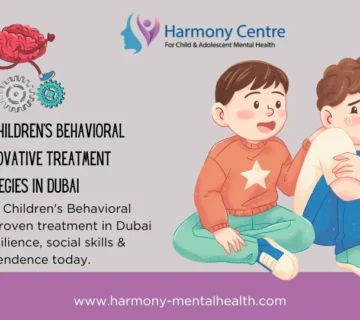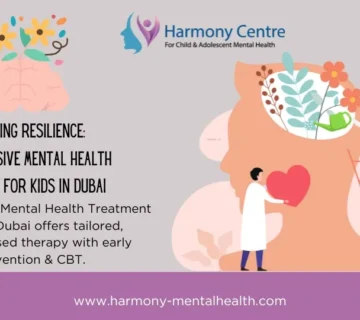Culturally Sensitive Mental Health Dubai: Inclusive Care for a Diverse Population at Harmony Centre
Discover culturally sensitive mental health care in Dubai at Harmony Centre. Our inclusive approach respects local traditions and offers personalized, evidence‑based support for every individual.
Contact Information
| Contact Method | Details |
|---|---|
| Phone | +971 (52) 8773268 / 04 558 2015 |
| Click Here | |
| info@harmony-mentalhealth.com | |
| Address | Office 409, Building Alrazi-64C, 26th St, Healthcare City, Dubai |
Introduction
Dubai’s vibrant, multicultural landscape calls for mental health care that respects and reflects its diversity. At Harmony Centre Mental Health Dubai, we understand that cultural sensitivity is not an add‑on but a cornerstone of effective treatment. Our integrated, evidence‑based approach is designed to deliver personalized care that honors local traditions and language preferences, ensuring every patient feels understood and supported.
Our commitment to culturally sensitive care means that we tailor our services to meet the unique needs of Dubai’s diverse population. We collaborate closely with families, educators, and community leaders to create an environment where every individual can thrive—both mentally and emotionally. In this article, we explore the importance of culturally sensitive mental health care, outline our inclusive approach at Harmony Centre, and offer practical strategies for integrating cultural sensitivity into everyday treatment.
Learn More About Harmony Centre • Contact Us
The Importance of Cultural Sensitivity in Mental Health
What Is Cultural Sensitivity in Mental Health?
Cultural sensitivity in mental health care involves recognizing, respecting, and incorporating an individual’s cultural background, beliefs, and values into treatment. It requires that mental health professionals understand how cultural factors influence behavior, emotional expression, and perceptions of mental health.
Key Aspects of Cultural Sensitivity
- Respect for Diversity:
Acknowledging and valuing the unique traditions, languages, and customs of different communities. - Tailored Communication:
Adapting language and communication styles to meet patients’ cultural needs. - Holistic Understanding:
Considering cultural influences on mental health, including family dynamics, social norms, and community values. - Inclusive Treatment:
Designing interventions that align with patients’ cultural beliefs and practices, enhancing trust and treatment adherence.
Why Cultural Sensitivity Matters in Dubai
Dubai is a global city where expatriates and locals coexist, each bringing their own cultural perspectives. In this diverse setting, culturally sensitive mental health care offers several advantages:
Enhanced Trust and Engagement
Patients are more likely to engage in therapy when they feel understood and respected. When mental health professionals acknowledge cultural differences, they build trust, which is essential for effective treatment.
Improved Treatment Outcomes
Incorporating cultural sensitivity leads to more personalized treatment plans. This alignment with a patient’s values and beliefs often results in improved adherence, greater satisfaction, and better overall outcomes.
Reduced Stigma
Addressing cultural factors can help dismantle stigma associated with mental health. Culturally tailored approaches foster open discussions about mental health and encourage individuals to seek help without fear of judgment.
Community Empowerment
By promoting culturally sensitive care, communities feel seen and supported. This empowerment leads to broader acceptance of mental health services and encourages early intervention, ultimately enhancing community well‑being.
Our Culturally Sensitive Approach at Harmony Centre
Comprehensive Assessments with a Cultural Lens
At Harmony Centre, our process begins with comprehensive assessments that consider the cultural context of each patient. Our multidisciplinary team conducts evaluations that include:
Standardized Testing and Direct Observations
- Validated Instruments:
We use scientifically‑validated tools to assess cognitive, emotional, and behavioral functions while considering cultural nuances. - Behavioral Observations:
Clinicians observe patients in natural settings to capture authentic behavior and cultural expressions. - Feedback from Families and Educators:
We gather insights from parents, teachers, and community leaders to understand how cultural factors influence behavior and expectations.
This holistic evaluation ensures that our diagnostic profile reflects both the clinical and cultural dimensions of a patient’s life.
Personalized, Culturally Adapted Treatment Plans
Based on our comprehensive assessments, we develop individualized treatment plans that integrate evidence‑based therapies with culturally sensitive strategies.
Tailored Interventions
- Language and Communication:
We offer services in multiple languages and adjust communication styles to meet the needs of diverse populations. - Family-Centered Care:
In many cultures, the family plays a central role in decision‑making. We involve families in the treatment process through family therapy and parental workshops, ensuring that care extends beyond the individual. - Culturally Adapted Therapies:
Our interventions are designed to align with patients’ cultural beliefs. For example, when treating anxiety or depression, we consider cultural attitudes toward mental health and integrate traditional practices that resonate with the patient.
Collaborative Goal Setting
- Culturally Relevant Objectives:
Goals are set in collaboration with patients and their families, ensuring that they reflect personal values and cultural priorities. - Ongoing Adjustments:
Regular follow‑up sessions allow us to refine treatment plans, keeping them responsive to cultural and personal changes over time.
Continuous Monitoring and Feedback
Our commitment to culturally sensitive care extends to continuous monitoring and regular feedback.
Ongoing Support and Adaptation
- Regular Check‑Ins:
Scheduled follow‑up sessions ensure that treatment remains effective and culturally appropriate. - Data‑Driven Adjustments:
We use outcome tracking to adjust interventions based on patient progress and evolving cultural needs. - Family and Community Input:
Continuous engagement with families and community representatives helps us stay aligned with cultural values and expectations.
Learn More About Our Culturally Sensitive Services • Contact Harmony Centre
Practical Strategies for Embracing Cultural Sensitivity in Mental Health
For Families
Foster Open Cultural Dialogue
- Family Meetings:
Hold regular discussions where each family member shares their cultural values and how these influence their feelings and behavior. - Share Cultural Stories:
Encourage storytelling about traditions, experiences, and heritage. This helps reinforce identity and promotes mutual understanding.
Engage in Culturally Relevant Activities
- Participate in Community Events:
Join local cultural festivals, support groups, and community gatherings that celebrate your heritage. - Cultural Art and Music:
Engage in creative activities that reflect your cultural background. These activities can be therapeutic and reinforce a positive self‑image.
For Educators
Integrate Cultural Sensitivity in the Classroom
- Multilingual Resources:
Use teaching materials and resources in the languages spoken by your students. - Cultural Awareness Programs:
Implement programs that celebrate diversity and educate students about different cultural perspectives on mental health. - Collaborative Learning:
Encourage group activities where students share their cultural backgrounds and learn from one another.
Work Closely with Families
- Regular Communication:
Establish open lines of communication with parents to understand their cultural values and expectations. - Culturally Adapted IEPs:
Collaborate with parents and mental health professionals to develop Individualized Education Plans (IEPs) that incorporate cultural considerations.
For the Community
Engage in Culturally Focused Mental Health Initiatives
- Public Awareness Campaigns:
Support campaigns that highlight the importance of cultural sensitivity in mental health care. Use local media and community centers to disseminate culturally relevant information. - Workshops and Seminars:
Attend community workshops that address mental health from a cultural perspective, offering practical tools for managing stress and promoting well‑being. - Digital Platforms:
Utilize online resources that provide mental health information in multiple languages and are tailored to diverse cultural groups.
Frequently Asked Questions about Culturally Sensitive Mental Health Dubai
Book a Consultation Now
Contact Information
Office Address:
Office 409, Building Alrazi-64C, 26th St, Umm Hurair 2, Dubai Healthcare City, Dubai
Phone:
+971 4 558 2015
+971 5 287 73268
Email:
info@harmony-mentalhealth.com
Final Thoughts about Culturally Sensitive Mental Health Dubai
Culturally sensitive mental health care is essential in a diverse city like Dubai. At Harmony Centre Mental Health Dubai, we are dedicated to delivering care that respects and embraces cultural differences. Our integrated, personalized approach ensures that every patient receives effective, evidence‑based treatment tailored to their unique cultural background. Through continuous support, multidisciplinary collaboration, and community engagement, we create a nurturing environment where every individual can thrive.
Embrace the power of culturally sensitive care and join us in building a future where mental health services are inclusive, respectful, and truly transformative.
Learn More About Harmony Centre
Get in Touch
👉 Book a Consultation Now: Call +971 4 558 2015
Join our online community and stay updated with our latest events, articles about Culturally Sensitive Mental Health Dubai



